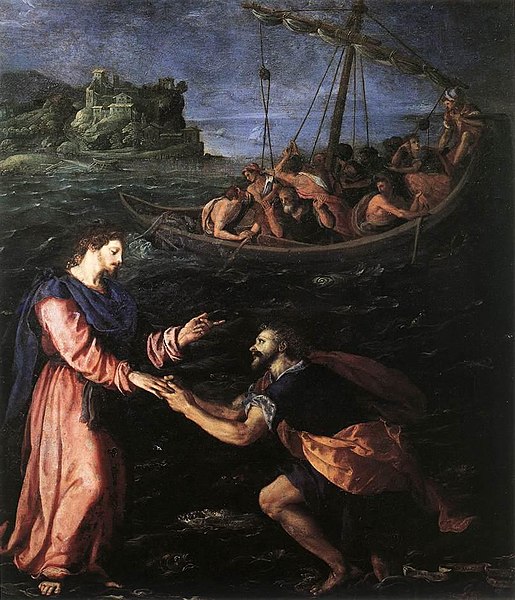Peter, also known as Simon Peter, is a prominent figure in the New Testament of the Bible. He was one of the twelve apostles chosen by Jesus Christ to be His closest followers and play a crucial role in the early Christian church.
Peter’s journey from a humble fisherman to a leader in the nascent Christian community is marked by pivotal moments of faith, courage, and human frailty.
In this discussion, we will explore key facts and events in Peter’s life, shedding light on his significant contributions to Christianity and his enduring legacy.
Peter in the Bible Facts
1. One of the Twelve Apostles
Peter was one of the twelve apostles chosen by Jesus to be His closest disciples. These apostles played a crucial role in spreading Jesus’ teachings and establishing the early Christian church. Peter was not only one of the twelve but was often recognized as a leader among them.

2. Fisherman by trade
Before becoming a disciple of Jesus, Peter worked as a fisherman in the town of Capernaum, located on the shores of the Sea of Galilee. He and his brother Andrew were partners in this fishing business.
Also Read: Facts About Joshua in the Bible
This background as a fisherman is significant because Jesus used it as a metaphor when calling Peter to be His disciple, saying that He would make him a “fisher of men.” In other words, Peter’s role would shift from catching fish to bringing people into the fold of Christianity.
3. Nicknamed “Rock” by Jesus
Jesus gave Peter the nickname “Cephas,” which means “rock” in Aramaic. In Greek, it is translated as “Peter.” This name had symbolic significance, signifying that Peter would play a foundational and stable role in the early Christian community.
Also Read: Jacob in the Bible Facts
It also foreshadowed his leadership role among the apostles. Jesus further emphasized this symbolism when he said, “On this rock, I will build my church,” suggesting that Peter would have a central role in the growth of Christianity.
4. Confessed Jesus as the Christ
Peter’s confession of faith is a pivotal moment in the New Testament. In Matthew 16:16, when Jesus asked His disciples who they believed Him to be, Peter replied, “You are the Christ, the Son of the living God.”
This declaration demonstrated Peter’s deep understanding of Jesus’ true identity as the Messiah. In response to Peter’s confession, Jesus praised him and stated that on this “rock” (Peter’s confession of faith), He would build His church.
This moment solidified Peter’s central role among the disciples and in the early Christian community as a key leader.
5. Walked on water briefly
Another well-known episode involving Peter is when he briefly walked on water with Jesus. This miraculous event occurred during a storm on the Sea of Galilee (Matthew 14:28-33).
When the disciples saw Jesus walking on the water, Peter asked to join Him. Jesus granted his request, and Peter stepped out of the boat.
However, when he saw the strong wind and became afraid, he began to sink. Jesus rescued him, emphasizing the importance of faith. This episode illustrates Peter’s impulsive yet courageous nature, as well as the need for unwavering faith in following Jesus.

6. Denied Jesus three times
One of the most poignant and challenging moments in Peter’s life was when he denied knowing Jesus three times during Jesus’ trial before his crucifixion.
This denial took place just as Jesus had predicted (Matthew 26:69-75). Peter’s denials were driven by fear and self-preservation, as he did not want to be associated with Jesus’ arrest and crucifixion.
Afterward, Peter was deeply remorseful, and this experience served as a lesson in humility and the importance of relying on God’s grace.
It also highlights the humanity of even the most devoted followers of Jesus, as Peter, despite his earlier declaration of faith, faltered in the face of adversity.
7. Played a key role in Pentecost
Peter played a central role in the events of Pentecost, which occurred shortly after Jesus’ ascension into heaven. Pentecost is described in the Book of Acts (Acts 2).
On this day, the Holy Spirit descended upon the apostles, empowering them to speak in different languages and boldly proclaim the Gospel to a diverse crowd in Jerusalem.
Peter, in particular, stood up and delivered a powerful sermon, explaining the significance of what was happening and calling the people to repentance and faith in Jesus Christ.
As a result, thousands of people were converted and baptized, marking the beginning of the Christian church’s rapid growth.
8. Performed healing and miracles
In the Book of Acts, Peter is portrayed as a conduit for divine healing and miracles. One notable instance is the healing of a lame man at the Beautiful Gate of the Temple (Acts 3).
Peter and John encountered a beggar who had been crippled from birth, and Peter, by the power of Jesus’ name, commanded the man to stand up and walk.
The man was miraculously healed and began to praise God, drawing a crowd and providing an opportunity for Peter to preach about Jesus.

9. Engaged in missionary work
Peter, along with other apostles, engaged in missionary work to spread Christianity to various regions. He is often associated with his mission to Joppa and Caesarea, where he interacted with Gentile converts, marking a significant step in the expansion of Christianity beyond Jewish communities.
One of the most noteworthy events in this regard was the conversion of Cornelius, a Roman centurion, and his household (Acts 10).
Peter’s acceptance of Gentile converts played a crucial role in the early church’s development and its outreach to non-Jewish populations.
10. Tradition holds he was martyred in Rome
According to Christian tradition, Peter met a martyr’s death in Rome during the reign of Emperor Nero, around AD 64-67.
It is believed that he was crucified, but at his own request, he was crucified upside down because he considered himself unworthy to be crucified in the same manner as Jesus.
Peter’s martyrdom underscores his unwavering commitment to his faith and his willingness to endure persecution and death for the sake of Christ.
